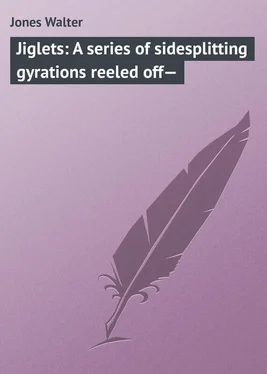Walter Jones - Jiglets - A series of sidesplitting gyrations reeled off—
Здесь есть возможность читать онлайн «Walter Jones - Jiglets - A series of sidesplitting gyrations reeled off—» — ознакомительный отрывок электронной книги совершенно бесплатно, а после прочтения отрывка купить полную версию. В некоторых случаях можно слушать аудио, скачать через торрент в формате fb2 и присутствует краткое содержание. Жанр: foreign_prose, foreign_humor, на английском языке. Описание произведения, (предисловие) а так же отзывы посетителей доступны на портале библиотеки ЛибКат.
- Название:Jiglets: A series of sidesplitting gyrations reeled off—
- Автор:
- Жанр:
- Год:неизвестен
- ISBN:нет данных
- Рейтинг книги:4 / 5. Голосов: 1
-
Избранное:Добавить в избранное
- Отзывы:
-
Ваша оценка:
- 80
- 1
- 2
- 3
- 4
- 5
Jiglets: A series of sidesplitting gyrations reeled off—: краткое содержание, описание и аннотация
Предлагаем к чтению аннотацию, описание, краткое содержание или предисловие (зависит от того, что написал сам автор книги «Jiglets: A series of sidesplitting gyrations reeled off—»). Если вы не нашли необходимую информацию о книге — напишите в комментариях, мы постараемся отыскать её.
Jiglets: A series of sidesplitting gyrations reeled off— — читать онлайн ознакомительный отрывок
Ниже представлен текст книги, разбитый по страницам. Система сохранения места последней прочитанной страницы, позволяет с удобством читать онлайн бесплатно книгу «Jiglets: A series of sidesplitting gyrations reeled off—», без необходимости каждый раз заново искать на чём Вы остановились. Поставьте закладку, и сможете в любой момент перейти на страницу, на которой закончили чтение.
Интервал:
Закладка:
Now and then a pig is squealing,
Or a hen or rooster keeling
Over suddenly in some sequestered spot.
Upon a close examination,
You may glean the information,
That by some lobster of a gunner it was shot.
Now and then a cow is snorting,
And around a field cavorting,
All because a load of shot has come its way.
Now and then a horse is rearing,
And in greatest pain appearing,
For it stopped another charge that went astray.
'Tis no wonder that the granger
Growls each time he sees a stranger,
Prowling through the woods and fooling with a gun;
For the shooting is alarming,
To the man who does the farming,
And he won't rest easy till the season's done.
That's a very fine song, I'll admit. Percy is just dead in love with it. He makes me sing it about ten times a day.
He says he can sympathize with the horses and cows, for he has "stopped many a charge that went astray" and knows how it feels.
We left the farmer with the gun, and Percy began to get woefully dry.
"Great Scott," says he, "I'd give almost anything for a drink of whiskey."
He spied an old gent with a kind face, tottering along the road.
"Just wait a minute," says Percy, "I'll see if that old gent carries a pocket flask."
So he went over and says:
"Kind sir, can you give a poor man who has heart trouble a drop of whiskey?"
"You should not drink that stuff," says the old man, "why do you do it?"
"Because I'm thirsty," says Percy.
"Then why don't you drink milk?" says he. "Milk, you know, makes blood."
"But," says Percy, "I'm not blood-thirsty."
"The doctors," continued the old man, "say that whiskey ruins the coat of the stomach. What would you do if that happened in your case?"
"I'd mighty soon make the darn thing work in its shirt-sleeves," says Percy.
We walked on and saw a farmhouse through the trees.
Percy went up to ask for some cold victuals and actually got the cold shoulder.
Then we struck the town of Freysburg. There's where poor Percy got fried to a rich, golden brown.
It happened this way.
We saw a large tent in which a revival meeting was going on.
"I'm going to take part," says Percy.
I tried to dissuade him, but it wouldn't go.
The deacon looked him over and says:
"Will the brother relate his experiences?"
I judged that Percy would have a very large contract on his hands, but he went at it like a man.
Everybody was shouting something, so every time Percy said anything, I shouted:
"Thank Heaven for that."
"Ladies and gentlemen," says he, "I've been a villain of the deepest dye."
"Thank Heaven for that," says I.
Percy looked at me and continued:
"Often I have felt tempted to commit suicide."
"Thank Heaven for that," says I.
"I'm heart and soul in the noble cause, but I'm penniless."
"Thank Heaven for that," says I.
Percy went on:
"I know that these noble men and women will raise a subscription to enable me to carry out my aims."
"Thank Heaven for that," says I.
Say, the way Percy got money surprised me.
Finally, we got clear of the tent and just sloped for it.
The next town a constable was waiting for us.
He spotted Percy right away.
"You're wanted for obtaining money under false pretenses," says he.
He took Percy to the court, which was held in the rear of a grocery store.
Going in, I knocked a big cheese off the counter and stooped to pick it up.
"That's all right," says the grocer, "it knows its own way around the counter by this time."
The judge asked Percy what his profession was.
"I'm an actor," says Percy. "When I'm on the stage I become so absorbed in my part that the theatre vanishes, the audience disappears – "
"Yes," commented the judge, "they go out and ask for their money back. What were you before you became a loafer?" asked the judge.
"I was a gentleman," says Percy.
"That's a good business, but you're not the only one who failed in it," says the judge. "Now what have you to say in your defense?"
"I must wait till my lawyer arrives," says he.
"Why," says the judge, "you were caught red-handed with the goods on. What could your lawyer say that would influence my decision?"
"That's just what I want to find out," says Percy. "But give me a little time and I will explain all."
"All right," says the judge. "Six years at hard labor. I hope you will be able to explain when you get out, or back you'll go for another six."
I was so afraid that the judge would give me time to explain why I was with Percy that I started to run and didn't stop until I got to Boston.
Now I'm going to sing you a little song, entitled: "He Made a Foolish Break And Got The Laugh; or, Wedded Persons' Compliments."
Said a young and tactless husband
To his inexperienced wife:
"If you would but give up leading
Such a fashionable life,
And devote more time to cooking —
How to mix and when to bake —
Then, perhaps you might make pastry
Such as mother used to make."
And the wife, resenting, answered
(For the worm will turn, you know):
"If you would but give up horses
And a score of clubs or so,
To devote more time to business —
When to buy and what to stake —
Then, perhaps, you might make money,
Such as father used to make."
There! I'm greatly relieved now that I've got that song off my mind. I was afraid I might break down, because it's so touching.
Talking of relief, puts me in mind of a friend of mine who wanted to be relieved, in the worst way, of a barrel of over-ripe sauerkraut. When I heard his tale of woe, I laughed so that I had to go and buy a new pair of suspenders.
You see, he had a German friend who had the kraut and didn't know what to do with it, so he offered to send it home to my friend Jenkins. Jenkins accepted and stored it in his cellar.
The next day, the fellow upstairs, named McCarthy, came down and raised thunder with his wife. When Jenkins came home he heard all about it. He went upstairs and saw the offender.
"Say," says he, "I understand you object to the smell down in my cellar."
"No," says McCarthy, "I don't object to it down there, but when it opens the cellar door and creeps upstairs I do object. It kept me awake all last night."
"Well," said Jenkins, "I'll put it out in the yard behind the dog house."
And he did.
The next morning he went out to feed the dog and found him – dead.
That day nine families moved out of Jenkins' flat, and the tenth was just going when he donated the kraut to an orphan asylum. The orphans broke loose and took leg bail.
There wasn't any one but the janitor to feed it to and he threatened to quit.
The last Jenkins heard of the kraut, it was about to be shipped to Dick Croker to sod his lawn at Wantage.
I came near being put under the sod myself the other day.
I heard that one of my best and oldest friends, J. Fishpond O'Morgan, was down with rheumatism in his arm, so I went around to see him.
As soon as I showed my face in the door, Fishpond howled:
"I'm saved."
I did not know what he was driving at, so I said:
"Sure."
"I want you to do me a favor," says he. "Go around to Prof. Sockem's and tell him to give you some of the usual medicine."
I went to old Sockem's, and just caught him in.
"Doctor," says I, "my friend O'Morgan sent me around for some of the usual for gout."
"All right," says he. "Arm, I suppose. Just roll up your sleeve."
I thought I had struck a maniac, so I tried to humor him.
He came back with a suspicious-looking black bottle and I thought I was a gone goose sure. You see, I had heard so much about the black bottle.
Читать дальшеИнтервал:
Закладка:
Похожие книги на «Jiglets: A series of sidesplitting gyrations reeled off—»
Представляем Вашему вниманию похожие книги на «Jiglets: A series of sidesplitting gyrations reeled off—» списком для выбора. Мы отобрали схожую по названию и смыслу литературу в надежде предоставить читателям больше вариантов отыскать новые, интересные, ещё непрочитанные произведения.
Обсуждение, отзывы о книге «Jiglets: A series of sidesplitting gyrations reeled off—» и просто собственные мнения читателей. Оставьте ваши комментарии, напишите, что Вы думаете о произведении, его смысле или главных героях. Укажите что конкретно понравилось, а что нет, и почему Вы так считаете.












